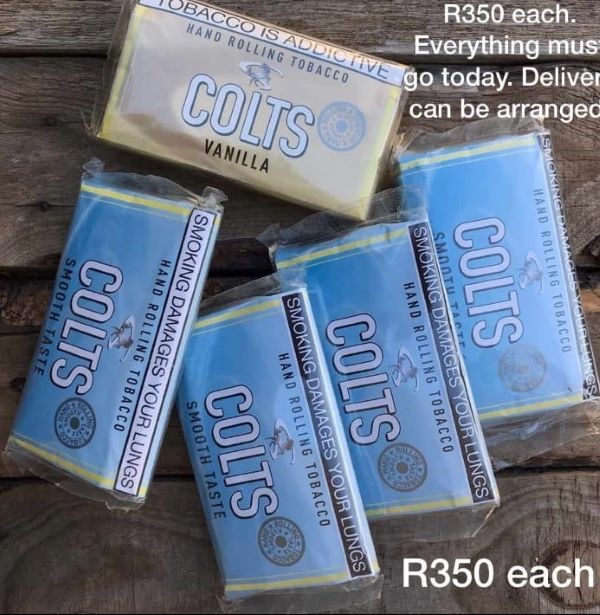
OPINION | Boom town: Of illicit smokes, smokkelaars and scarcity
So opportunity beckoned for those with an established underground network of distributors ready to supply and meet the desperate demand. And the prices surged and will continue to do so, writes Michael Gonzo.
A single or losse entjie of largely unknown brand and origin costs R10 a pop. R200 for a pack of no-names and R2 000 for a gross.
And the longer the tobacco ban lasts, the more prices will shoot up - it’s a seller's market and the nicotine junkies are begrudgingly handing over their cash to these modern-day bootleggers who have filled the prohibitionist void created by the architects of the nanny state we now inhabit.
Anything at any cost to stop the twitching.
Three weeks ago, a known- brand would have set you back R80 for a pack of 20s.
The purveyors of the under-the-counter contraband are also not averse to channeling Adam Smith in explaining the mark-ups.
"Are you familiar with scarcity, my brother," said one.
Another blamed the internecine politics of the ruling party: "You should blame the factions within the ANC," offered another.
Further research also showed that "loose tobacco" had gone from R40 to around R350 for 50g - over the same time-frame.
These hyper-inflated prices almost certainly do the exact opposite of the ban’s ostensible intention - to stop people from sharing a smoke.

An example of a brand now being sold on the black market. (Supplied)
If one is to follow logic, then surely this would increase the probability of (poorer) people sharing "a zol" to satisfy the (nicotine) craving.
Also, a zol in the hood is the colloquialism for a joint, a blunt, a reefer and yes, it also gets puffed and passed according to marijuana lore - but seeing that it is now cheaper to buy weed than it is to procure cigarettes in the Republic, one-person blunts are not beyond the purple.
The hood’s economy is one of a shared living experience - from food to crammed minibus taxis to cramped quarters, to sharing a skyf.
It is an ecosystem forged by people failed by several governments and largely ignored by us and our lack of genuine empathy and interest in the well-being of our fellow human being.
And there is almost zero policing happening in these areas; a situation that would have been exacerbated as many of those in blue have been diverted and given the monumental task of doing an audit of the books of anyone seen smoking in public.
Also, with people seeking cheaper alternatives to these over-priced cancer sticks, hookah pipes have seemingly found a renewed popularity - and this is usually also a shared experience with the pipe moving from hand-to-hand and mouth-to-mouth.
Others have resorted to a kind of Anarchist’s Cookbook of smoking - videos and recipes for making rollies out of tea leaves have become a thing.
If it weren’t enough that we have been in a perpetual "broken window" state of being (yes, you jay-walking over there and you who knows someone who can squash traffic fines, you are breaking the law), the South African government has conspired to make millions more of its citizens criminals under the Disaster Management Act by its outlawing of the sale of tobacco products.
I am almost certain that no one is going to snitch anyone out to the state - goodness knows there’s enough WhatsApp evidence to put a fair chunk of the 11 million smokers in the clink - for buying and selling of contraband tobacco.

To (mis) quote another popular opportunist, Baron Rothschild: "When there’s blood on the streets, buy property."
And so opportunity beckoned for those with an established underground network of distributors ready to supply and meet the desperate demand.
And so the prices surged and will continue to do so.
A few weeks into the ban and rumours abounded of criminal networks on the Cape Flats looking to muscle in on the illicit tobacco (and alcohol) trade and its promised quick riches, buying up all the skyf and dop they could get their dirty hands on.
Unsurprising, given the opportunism of the criminal economy and its invisible and insidious tentacles which reach into all of our lives; so it stands to reason that the underworld’s masterminds wanting a slice (if not all) of the pie.
With record levels of people set to be without jobs due to the effects of Covid-19, how many of us without supporting networks or a lack of opportunity in a constricting economy, will end up in this or any other criminal key chain to put food on the table?
The criminal economy has been allowed to cast its shadow even further, allowed to become ever more darker than the proverbial smoker’s lung.
- The contributor is a sub-editor at News24 and writes under a pseudonym.